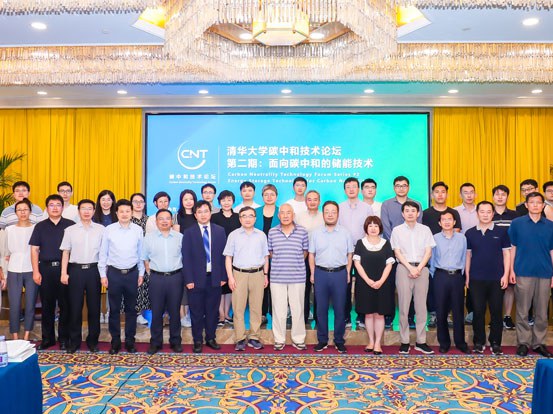Energy Storage Forum Has an Eye to Net Zero
On July 11, 2022, with the support of Energy Foundation China (EF China), the Tsinghua Institute for Carbon Neutrality (ICON) hosted its second Carbon Neutrality Technology Forum on the theme of energy storage. This session was focused on the R&D of energy storage technologies and their industrialization, with the aim of helping draw a roadmap for the large-scale development of energy storage technologies in China. Zou Ji, CEO and President of EF China and He Kebin, ICON Dean, made opening remarks for the forum, which was watched by over 5,000 people online via a livestreaming service.
Zou Ji said that energy storage is critical for converting large-scale, high-ratio, and intermittent renewables into a safe, smooth, and continuous power source. As a higher share of power connected to the grid is generated from renewables, energy storage will be further highlighted, in his opinion. Building energy storage is a complex project in which power sources, grids, and electrical loads need to be configured with different storage technologies to avoid curtailments and ultimately to support the upgrade of China’s energy structure, he said. China needs to strengthen overall planning, optimize resources allocation across electricity generation and power-using regions, and identify applicable scenarios of pumped storage hydropower, air energy storage, chemical energy storage, and other technologies that are suitable to local conditions, according to Zou. The robust development of energy storage also requires oversight and enabling policy improvements, featuring science-based allocation of costs and benefits that can mobilize different stakeholders, Zou said.
In his speech, He Kebin said that global patent applications for low carbon technologies show that battery and energy storage technologies have emerged as a new frontier of knowledge. China should continue to follow and invest in this frontier, particularly in the area of international patent protection, he said.
Li Hong, Researcher of the Institute of Physics at the Chinese Academy of Sciences, said that lithium battery energy storage has dominated the current energy storage market in China; however, the sustainable supply of lithium resources in China is under enormous pressure. In the future, in his opinion, China should improve the efficiency and lifespan of lithium batteries and carry out recycling programs. On the other hand, he said, China should also focus on developing energy storage technologies that are not reliant on scarce resources, including sodium-ion batteries, organic batteries, and other electrochemical energy storage technologies; physical energy storage technologies, such as compressed air, thermal storage, and cold storage; as well as hydrogen storage technologies.
Half a dozen experts were also invited to make academic speeches, including Chen Haisheng, Researcher of the Institute of Engineering Thermophysics at the Chinese Academy of Sciences; Hu Yongsheng, Researcher of the Institute of Physics at the Chinese Academy of Sciences; Li Xianfeng, Researcher of the Dalian Institute of Chemical Physics at the Chinese Academy of Sciences; Shi Yixiang, Professor of the Department of Energy and Power Engineering at Tsinghua University; and Yu Zhenhua, Executive Vice President of the China Energy Storage Alliance. They covered topics such as advanced compressed air energy storage, sodium-ion batteries, flow batteries, hydrogen energy storage, and a review and outlook of global energy storage development.
In the afternoon session, Zhang Qiang, Professor of the Department of Chemical Engineering at Tsinghua University, introduced the research outline of A Roadmap for the Chinese Energy Storage Technology: Net Zero by 2060 supported by EF China. Twenty scholars provided valuable suggestions for how to improve it. They included Academician Jin Yong from the Department of Chemical Engineering at Tsinghua University; Fan Lizhen, Professor of the Institute for Advanced Materials and Technology at the University of Science and Technology Beijing; Zhou Henghui, Researcher of the College of Chemistry and Molecular Engineering at Peking University; Chen Haosen, Professor of the Institute of Advanced Structure Technology at the Beijing Institute of Technology; Zhang Qiang, Professor of the Department of Earth System Science at Tsinghua University; Wang Baoguo, Professor of the Department of Chemical Engineering at Tsinghua University; and Lu Xi, Professor of the School of Environment at Tsinghua University.
This year, Energy Foundation China will continue its strategic cooperation with Tsinghua to map out the prospects and pathways for carbon neutral technology development in China. We plan to co-launch a series of research projects on the frontier issues of technological innovation, infrastructure layout, and industrial strategies for key technologies such as energy storage, solar and wind power, and new power systems. EF China will also support this Carbon Neutral Technology Forum series for academic exchanges, where scientists can share their insights.

More than 20 scientists attended the second Carbon Neutrality Technology Forum on the theme of energy storage, hosted by the Tsinghua Institute for Carbon Neutrality on July 11, 2022, with support from EF China. Photo by the Institute of Carbon Neutrality, Tsinghua University



